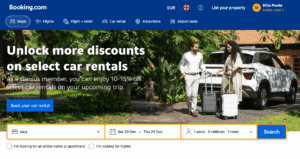5 Things to Consider When Buying a Domain Name
Looking for some quick tips about securing and buying a domain name for your business? Here’s our expert guide to domain buying, covering everything from hidden fees to privacy protection. Purchasing a domain name is an exciting thing for a new business, but there’s much more to it than simply finding the ideal name. Before you begin, there are a few things you ought to know. It’s always worth remembering that not all businesses selling domains (known as domain registrars) are the same. Some use tactics like hiding fees or promoting your data to earn more cash, which may have an enduring influence on your enterprise. In this post, Name Experts Director Joe Uddeme – a seasoned domain name broker – flags up some common things you should watch out for. 1. Look out for hidden charges As with any purchase choice, cost can be a big element. It is easy to be tempted into buying a domain at a really low cost. But don’t be fooled: a few domain registrars provide promotional pricing at an extremely low price but then hide a lot of fees in the contract, lock you in, and charge high renewal prices. Generally, be aware that registrars offering rock-bottom domains may have additional, less-than-ethical techniques to make money. These strategies include: Adding in hidden prices: Many registrars rely on the fact that most individuals do not read the fine print. Before you make a domain purchase, review the Buyer’s “Terms of Service” for any questionable terms, duties, or fees. Be sure to check what the renewal rates will be, and be certain you are only buying what you need and want. Making you pay to edit your WHOIS or RDAP listing: Watch out for registrars that charge an “administration fee” when you need to edit your WHOIS or RDAP records. Registrars will often try to “upsell” or “cross-sell” you items you don’t require. For example, they might recommend you purchase extra domain endings that are extraneous instead of helpful (for instance, .info or .co). Or, they might offer to package your domain with a bunch of other services you might never use. Charging transfer charges: Make sure the “Conditions of Service” don’t have “transfer-out” charges for moving your domain name to another registrar. These fees could be exorbitant and they violate ICANN policy (ICANN is the non-profit corporation that oversees the use of Internet domains). Beyond the cost, a few registrars make it nearly impossible to perform a transfer by making the transport procedure cumbersome and hard to navigate. It’s a good idea to check into how easy the transfer process is before deciding upon a registrar. 2. Protect your privacy Unprotected data is vulnerable to being mined by spammers and scammers. Start looking for domain registrars that offer privacy protection for free. Be cautious about dealing with registrars that charge a premium for “privacy solutions,” particularly any who offer to place their details on these registries instead of yours, which covertly gives them possession of the domain. 3. Guard your info Beyond failing to protect your personal data from public records, some registrars actively sell your information to third parties like marketing associations. Some registrars even mine the WHOIS database and then send false renewal invoices, getting visitors to unknowingly transfer their domains. Be certain to find a registrar that promises never to sell or misuse your client information for marketing purposes. 4. Focus on transparency Look for registrars that offer transparency in their pricing. You should, for example, be able to readily find your renewal prices, as well as the processes for transferring or canceling your domain name registration. Some registrars offer cheap registration during the initial purchase, but then charge flat-rate costs to renew your domain the following calendar year. They also might make it very difficult to cancel your order. Start looking for a registrar with upfront pricing info and terms of service to avoid surprises later on. 5. Differentiate support from sales Some registrars don’t have support staff but instead have salespeople who are trained to sell you add-on services you may not need – all in the guise of friendly customer support. Look for a registrar that offers courteous and professional support and help, not one that sees you as a cash register they keep trying to ring. With careful study before you opt for a domain, you can side-step some unfortunate traps and make sure your domain name — and your business – are in good hands for many years to come. About the author Joe Uddeme is Director and Principal of Name Experts, one of the world’s top domain name brokerage services. He has overseen domain name sales and acquisitions totaling more than $150 million and is renowned worldwide as a go-to expert in buying and selling premium domains. Contact us at: [email protected]






